- Home
- Alistair Moffat
The Night Before Morning Page 6
The Night Before Morning Read online
Page 6
Meanwhile, sixteen hundred miles north-east of Antwerp, in the Gulf of Finland, between the port of Kronshtadt and the port at Leningrad, another U-boat waited in the darkness of the deeps for its orders.
It became quickly clear in the following weeks that the precision and coordination of the terrible events of October 3rd and 4th had not been linked to any coherent plan of action. It was as though the Germans were taken as much by surprise as the Allies. Von Klige had talked of the need to fight desperately, fanatically, in order to buy time and it seemed that the use of these devastating weapons had only become a possibility a short time before one of them was unleashed on London. In no condition to convert their retreating and depleted armies into guards able to control hundreds of thousands of Allied prisoners of war, the Germans relied on frequent reminders of the ever-present threat of detonating more atomic bombs to induce compliance. Instead of making any attempt to deal with the impossibly vast logistics of detaining, feeding and supplying hundreds of thousands of captives, their major focus seemed to be to expel Allied soldiers from Europe as soon as possible, back to the USA, to Canada and to Britain.
This extraordinary reversal resulted in a stunned silence all along the front. No more guns roared, no more machine guns rattled, and nothing moved on the roads.
Appalled at the flow of fearful statistics and photographs of twisted, incinerated bodies and the rubble of London – only recognisable by the stubborn survival of the southern façade of Westminster Abbey – almost all Allied units complied with the German demands. On their part, the Nazis insisted on complete disarmament and encouraged Allied soldiers to think that their war was over and they would be home soon. All of the vast supply dumps were commandeered, and any hesitation to cooperate was met with a brutal and instant response. It was later said that when General George Patten refused to hand over his ivory-handled pistols, an SS colonel shot him in the chest at point-blank range.
The Germans could also call on the loyalty of an army of ghosts. Since D-Day, almost two hundred and fifty thousand of their best front-line soldiers had been held in prisoner-of-war camps on the British mainland and, on their release, they immediately assumed the role of an occupying army. Transport ships began to shuttle British soldiers from Antwerp back to Harwich, Felixstowe and Ipswich – where they were met by motorised military escorts and told they would be marching back to their regimental depots around the country.
With little in the way of supplies, no wet weather clothing, only the fatigues they wore at the moment of surrender and bivouacking in the open as the October weather grew colder and damper, the 1st Battalion of the King’s Own Scottish Borderers began a long march home. We had to make our way up the length of England to its most northerly town, to our depot at Berwick-upon-Tweed. On disembarkation at Harwich, all of our senior officers had been detained. Some of the more cynical reckoned they would not be bashing the roads like us but on their way north by train. We had no idea where they had been taken, however, and as we made our way through the flat Suffolk landscapes, I feared that they might have been executed. A leaderless army is half beaten before it begins to fight.
Having not let on that my German comprehension was excellent, I overheard a great deal as we marched north. It became brutally clear that our escorts – former prisoners of war from the huge camp at Devizes, thugs rather than soldiers – were bent on vengeance. It seemed not to occur to any of these former POWs that any of their captives might understand what they were saying to each other, and their boasting was uninhibited.
‘We should bomb them again,’ said one SS sergeant. ‘We have won the war by a stroke of the Führer’s genius, but we need revenge for Hamburg, Dresden and for the destruction of Berlin.’
But since none of them were in a position to order the detonation of more atomic bombs, they took it out on us. When we at last stopped, at the end of a long first day, we were formed up into ranks and addressed by an SS officer who had somewhere acquired a swastika armband.
‘You know the Romans? Yes?’ In somewhat halting English, but with evident relish, this little man strutted back and forth, wagging a finger in the air. ‘Not obey orders, we de-ci-mate you.’ His smirk chilled me, convinced me he would not hesitate. ‘Kill one man in ten. No question.’ He held up both hands, spreading his fingers and counted them off. ‘One out ten, we kill. You all obey. Or you die. Simple.’
In the course of what I began to realise was a hunger march, I heard several comments about stragglers, about shooting them anyway, not waiting for exhausted men to fall behind or drop. And always, push them harder!
More Borderers died in those terrible October days than in the battle for Normandy and France. When we finally came to the southern bank of the Tweed and crossed to Berwick, only about a hundred men had survived the journey. I found that I was the most senior officer. All of the familiar burdens returned, but without any power to ease them. In desperate circumstances like these, the Borderers needed leadership of some kind, however ineffectual in the face of such inhumanity and gratuitous cruelty.
When we drew ourselves up into ranks on the parade ground between Berwick Barracks and the Elizabethan town walls, calling on every shred of regimental pride to make our backs straight and keep our eyes front in this, the home place of the Borderers, we came to attention. The officer who had threatened decimation all those weeks ago, and had carried it out more than once for the slightest offence, asked who the senior officer was. I stepped out of the ranks, saluted and identified myself.
Smiling at me, this man said, ‘You are responsible for the conduct of your men. Completely responsible.’
Perhaps only five foot six but straining to stand as tall as he could, clutching a black swagger stick behind his back, he had to look up at me, and I could see that irked him. He struck me as someone who relished any opportunity to exert dominance but lacked the height to do it physically. As though he was weighing me up, the officer walked around behind me. I stared straight ahead, standing to attention. At any moment, I sensed he might strike me with the stick but instead he faced me and poked my chest with it.
‘You are now a defeated people. To survive, you must be loyal to the Reich and our Führer. Well?’
‘Yes, sir,’ I replied.
He barked back at me, ‘Disobedience or disrespect will mean de-ci-ma-tion. You understand?’
‘Yes, sir, I do. Thank you, sir.’
This pleased him and, it being late in the evening, we were dismissed. My men were out on their feet, but at least that night we would have a roof over our heads, what was once our own roof. Permitted to sleep in our old barracks – not through kindness but in an attempt at incarceration – and supplied with basic rations, we began a life of what turned out to be the daily attrition of slave labour.
The Germans used the small harbour at Berwick to land supplies and equipment from across the North Sea. In the icy winds, we manhandled cargoes onto the quayside beyond the old walls. It was there, witnessing a moment of casual cruelty, that something snapped in my head. After a wet tea-box container had slipped out of his hands, one of the Borderers had fallen at the very edge of the quay. But before he could get up, a German guard ran forward and booted him off balance so that he toppled into the freezing waters of the harbour. Unable to swim, thrashing the water, he called frantically for help, but the guards turned their guns on us, daring anyone to move to rescue their comrade.
That night, I passed around the word. If one of us, or a small group, tried to escape, they might well succeed, but those left behind would all be shot in reprisal. We needed to mount a mass breakout. All or nothing. And once we had broken out, we had to split up into ones or twos to make it more difficult for those who would pursue us. Some might be caught but surely some would also get away. There was no future in this death camp. We would all die anyway.
‘There’s supposed to be a tunnel,’ whispered Private John Campbell. ‘That’s the way out.’ For reasons of safety, the powder magazine had bee
n built outside the barracks, beside the Elizabethan walls, and Campbell was sure that a tunnel led to it: ‘The magazine is barred and bolted from the inside and there’s only one door, for safety and security.’
‘But where is the entrance?’ I asked.
‘Must be through the officers’ mess,’ he replied.
‘Damn! That’s used by the Germans. What we need is a diversion.’
The next day, after darkness had fallen, I positioned myself in the corner shadows of the cobbled parade ground, surrounded on three sides by high barrack blocks that made my voice echo.
‘Achtung! Achtung! Jetzt auf Parade! Schnell! Schnell! Achtung an alle!’ I bellowed. ‘Colonel Stauffel’s adjutant has telephoned. He will be here in minutes. Out now! On parade now!’
On the north side of the quadrangle, two sentries were hurriedly fiddling with the padlock and chains on the main gate. Others were clattering downstairs, buckling on their kit and streaming into the open.
I slipped back into the barracks and, with all of my men behind me, ran along the corridor and smashed open the door to the officers’ mess. Our impetus overwhelmed two Germans who had been slow to react to my theatricals. A farrier in a previous life, Corporal Angus Wilson used his tremendous strength to snap the neck of one and the other was simply overrun and kicked senseless. In seconds, Private Campbell had sounded the wood panelling, found a snubbed catch next to the fireplace and we were in.
And plunged into total darkness. Without any torches or even matches, we stumbled and scrambled down a narrow stair, feeling for the damp walls, moving as fast as possible. I had pulled the panelling door shut, hoping it would stay flush and that we would not be pursued by guards who did have torches and could see where they were going. After a frantic few minutes, punctuated by much swearing and many scraped elbows and knees, Campbell led us up another stair and into the powder magazine. At the far end was a massive wooden door. Bolts were felt for and slid back. The door pushed open to reveal an astonishing promise of freedom: the vast and dark horizon of the North Sea greeted us. No one hesitated as we dropped down the face of the Elizabethan walls and onto a dangerously open and wide expanse of grassland, what had been a golf course before the war. For our lives, we ran north, scattering in all directions in ones or twos, putting as much distance as possible between us and the guards before they realised that no colonel was about to arrive in his staff car.
Knowing the town and the ground around the barracks, I made rapid progress at first, running north through the sleeping streets past some grand houses and then making for Halidon Hill. From that vantage point, I could see back to Berwick and the sea beyond. Lingering only to look for the headlights of pursuing vehicles coming in my direction – and thank God there were none – I turned inland, up the Tweed Valley, towards home.
‘Will you accept the charges?’ There was an agonising pause. I looked around the telephone box I had come across in the village but could see no lights on and no one about. ‘Please go ahead, you are now connected.’
‘Hello. Katie? It’s me. Yes. David. I need your help. Desperately.’
*
As much as the cold, it was the wind that kept me awake, the long soughs of it around the tower. I could see that some warmth might come, watching the slanting winter sun wash down the flanks of the distant hills; and along the rigs, the ridges of the valley unfolding below, long shadows began to shorten.
Although I was very cold, constantly pulling my coat tighter, all of the everyday glories of the great valley touched my heart once more. It had been a long time. Camouflaged against the snow, I watched a flock of ewes moving slowly in the field on the far side of the track.
Katie was late. I had an uninterrupted view along the eastern track for about half a mile before it turned behind a crag, but there was no sign. Perhaps she had been stopped, questioned, arrested? All varieties of jeopardy spooled through my imagination, mixed with guilt for asking her to come, and self-justification. What choice did I have?
There was no one else I trusted. And there had been no one else I loved.
Before the chasm of the war opened and swallowed the world we once knew, Katie and I had met as undergraduates at St Andrews University: ‘Bejant’ and ‘Bejantine’, in the odd and slightly arch terms for first-year students. Both of us Borderers, both of us unsure of ourselves, we fell back on the familiar at first. Just as Katie did, I felt myself in the company of scores of bright people, all cleverer and more confident. But we quickly grew out of that and by the time we boarded a train at Leuchars station bound for home and Christmas, we could not wait for the following term, when we would resume what neither of us understood had become a love affair.
Something flickered on the edge of my field of vision, like a crow lifting into the air.
And then I heard the drone of its engine. Flying low over Brotherstone Hill to the west, the iron cross insignia of the Luftwaffe visible on the underside of its wings, a spotter plane was approaching fast. Clearly, the Germans were scouting the countryside for the Borderers who had broken out of Berwick Barracks. I pulled the hood of my duffel coat over my head and, to avoid attracting attention, turned very slowly to face the tower wall. I prayed that Katie was not on the road, and if she was, that she had seen the plane and hidden. Once I heard the engine begin to fade, I watched it moving eastwards towards the sea. I imagined they were methodical – quartering the Ordnance Survey grid – and would soon turn and come back in this direction.
And then I saw her, as if by magic, appearing from nowhere. Cycling quickly up the track, her body bent low and forward to push down hard on the pedals, her fair hair tucked under a black beret, she quickly reached the wrought-iron gate at the foot of the crag. I rushed down the spiral staircase to shove open the wooden door – and there she was. There she was.
I could say nothing. I felt my heart surge. I had no words. Katie cocked her head to one side, and smiled. Like she always did. I felt tears running down my face, the prickle of warm tears on my cheeks.
‘Oh, David. There’s nothing of you.’ She leaned her bicycle against the doorway and took my arm, gently pushing me inside. ‘I think we should get all of this and ourselves out of sight. Don’t you?’
Still I could say nothing, only smile and shake my head.
Katie turned to me. ‘Come here.’ She held me for a long time in the doorway of that old tower, and my tears would not stop.
After a time, some words came. ‘I’ve never forgotten how beautiful you are. But I did forget how your smile could swell my heart.’
Taking off her beret, she shook her hair loose and looked up at me. She held my hand.
‘I must look a sight,’ I apologised.
She laughed. ‘Yes, and around you there is an interesting aroma.’
I started to laugh, too, recalling many withering rebukes about my student dishevelment. By contrast, Katie sparkled. Her fair hair kept back off her face with an Alice band, her looks were classical, as someone I glared at once said. Classical beauty could be cold, an icy, wintry perfection, but it was the kindness that glowed from her eyes that melted my heart. And the hearts of many others at St Andrews.
We had sometimes walked out to the end of the pier, a long, wave-worn finger of stone that reaches into the North Sea. With the ruined cathedral and the university behind us, we found ourselves in our own private world. Sitting as close as we could, folded into each other, it was enough for me to look at Katie, to gaze into her welcoming eyes. No words needed. I could find a peace in that, and sometimes to shut out even more of the outside, I would hold up my hands on either side of our faces to blinker us. Sometimes my gaze disconcerted Katie and she would laugh and shake her head. But she never looked away.
‘Aren’t you going to invite me into your castle?’
We had been standing at the foot of the spiral staircase for long moments and I did not want to move, to make ordinary time restart. The tears had come, I understood later, because no one had touched me with a
ny tenderness for a very long time, and no one had smiled at me with such warmth.
With a gun slip slung over one shoulder, a knapsack over the other and the basket from her bicycle full, I realised that Katie had remembered everything I asked for, and more.
‘Now, let’s see what we have,’ she said.
We sat in an embrasure in the tower wall by one of its few windows. I had not eaten anything for three days, only drinking from burns and a horse trough I passed. She lifted a linen napkin off the basket to reveal wonders, the like of which I had not seen for a long time. Katie had baked bread, there was cheese, four boiled eggs and a twist of salt-cured ham, some wrinkled apples, a comb of honey and a half-bottle of whisky.
‘Slowly, now,’ she said as I tore off a hunk of bread and some cheese. ‘Your stomach will be the size of a golf ball.’
As I ate, Katie undid the buckles of the gun slip. She had brought from her father’s cabinet an old, beautifully kept Dickson shotgun, its barrels well oiled, the wooden stock polished and the metal action engraved with the maker’s name. A thing of great beauty. There was a box of twenty-five twelve-bore cartridges, an oiled cloth, an old army bayonet and a penknife. From her knapsack, she brought out two packets of Player’s Navy Cut, two boxes of matches, a torch, two candles, six pencils held together with a rubber band and the thick, leather-bound notebook I had asked for. ‘And this is my mother’s cashmere wrap to keep you warm. Light as a feather. Made in Hawick. I shall want it back.’
On some musty, dust-covered old hay I found in the basement store, shaken and taken up to the top chamber, I lay down and slept for the whole day, filled with food and wrapped in cashmere. When Katie came back at gloaming, certain she had not been seen, we opened the whisky and exchanged fiery sips. What would have made the moment even warmer was a fire in the vast old grate, but we were taking enough risks.

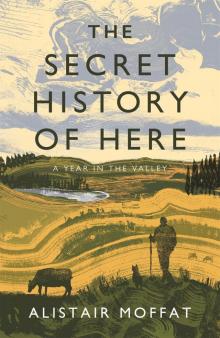 The Secret History of Here
The Secret History of Here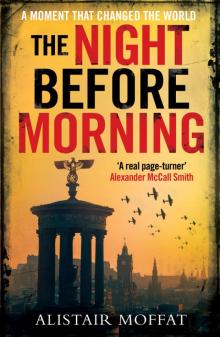 The Night Before Morning
The Night Before Morning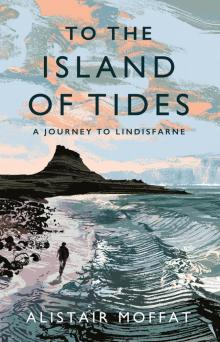 To the Island of Tides
To the Island of Tides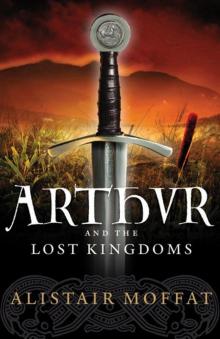 Arthur and the Lost Kingdoms
Arthur and the Lost Kingdoms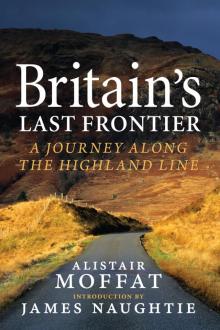 Britain’s Last Frontier
Britain’s Last Frontier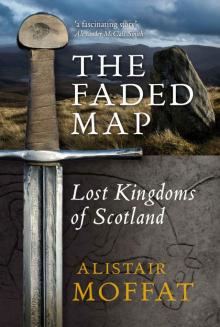 The Faded Map: The Lost Kingdoms of Scotland
The Faded Map: The Lost Kingdoms of Scotland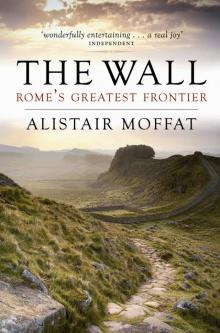 The Wall
The Wall